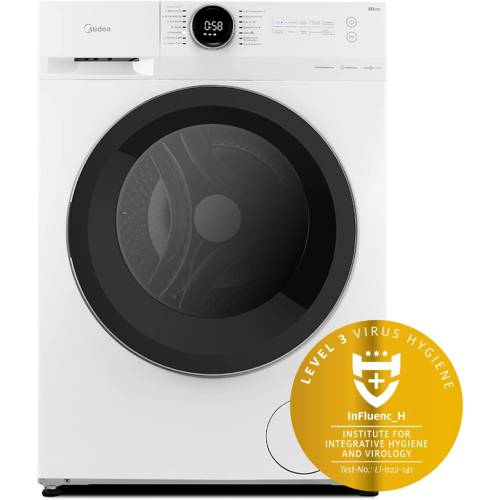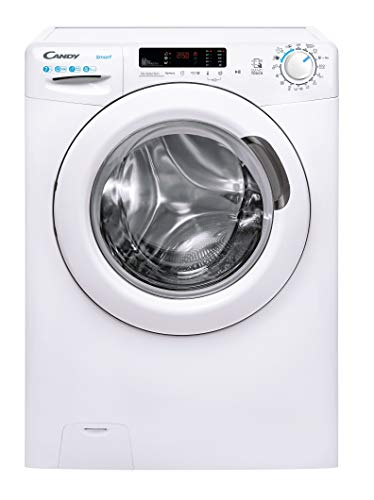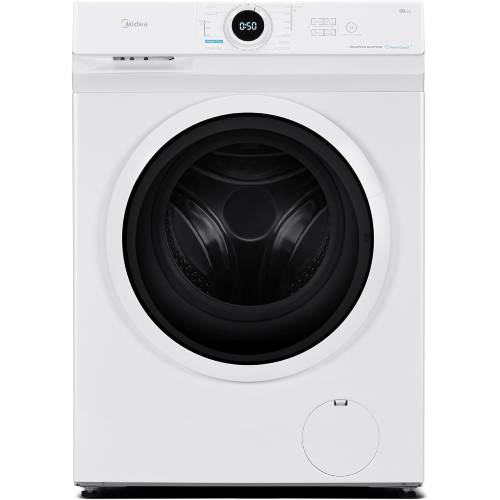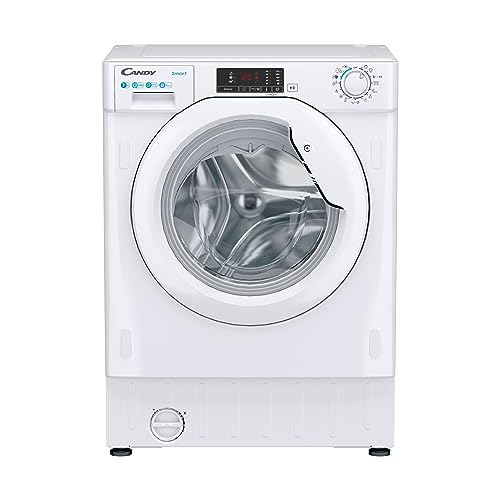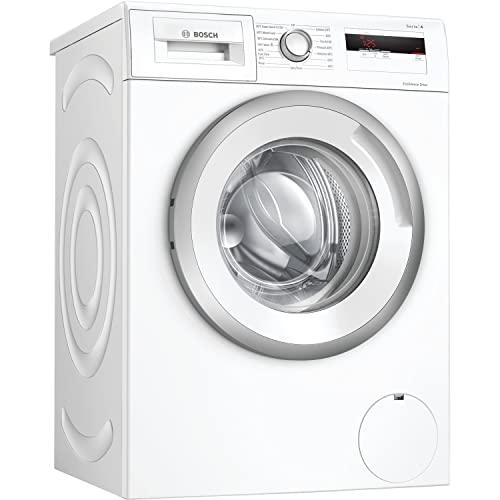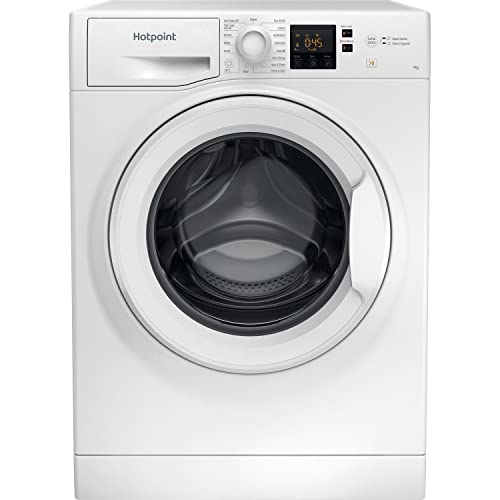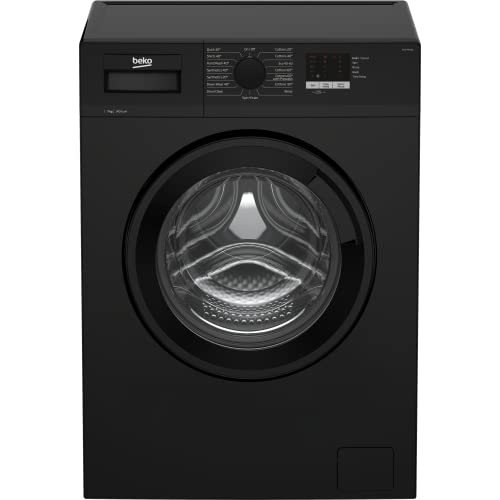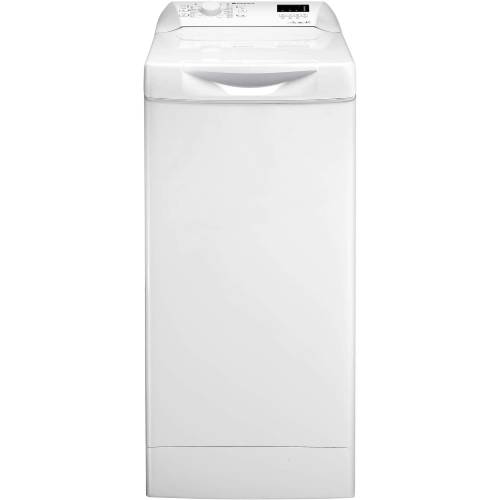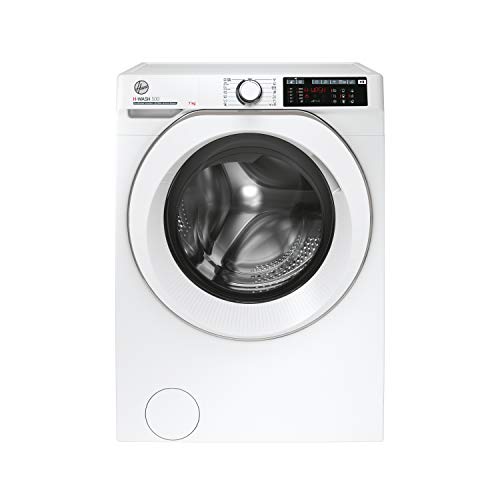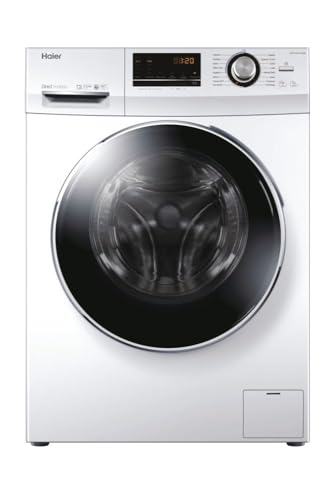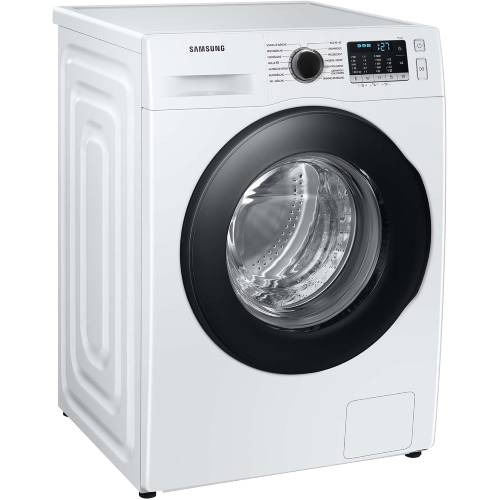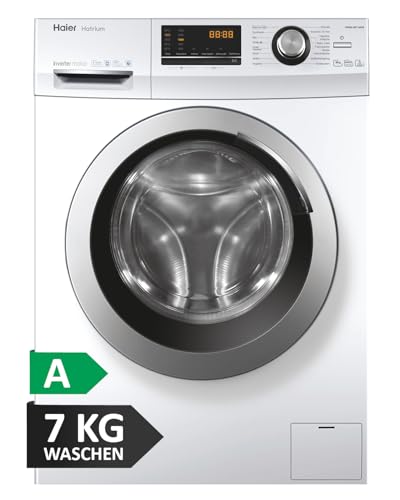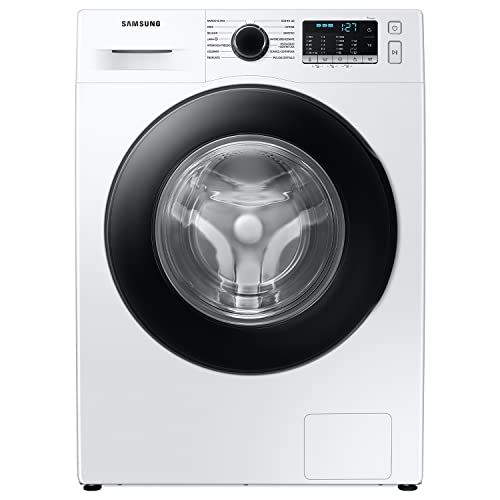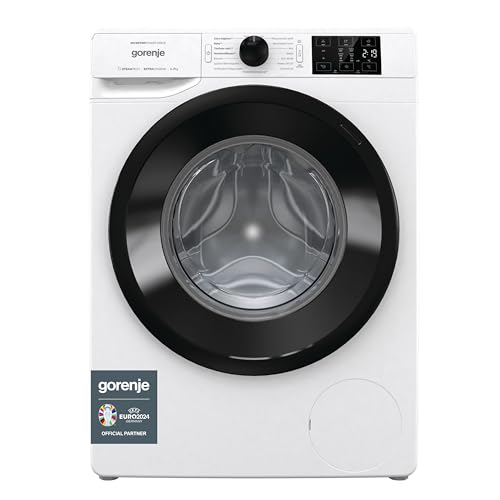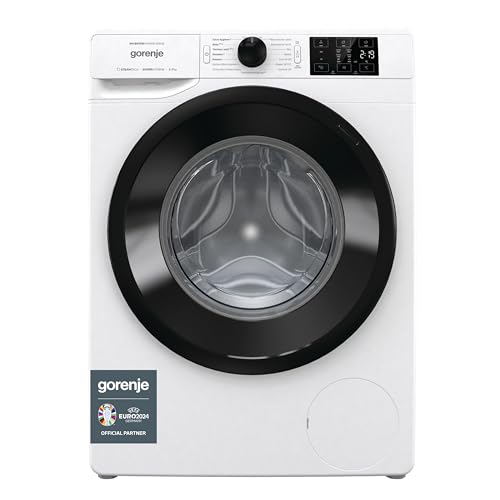Are 7 kg washing machines worth it?
7 kg washing machines have an average overall score of 6.6, which is lower than the market average of 7.1. Their performance is similar to 6 kg washing machines, but generally inferior to 8 kg models (7.1 points) and 9 kg models (7.5 points).
User ratings for 7 kg washing machines are 8.2 points, slightly higher than 8 kg models (7.9 points), but lower than 6 kg (8.1 points) and 9 kg models (8.3 points).
About 20% of washing machines on the market have a 7 kg capacity.
What are the main advantages of 7 kg washing machines compared to other capacities?
The main advantages of 7 kg washing machines compared to other capacities are as follows.
- Lower price: 7 kg washing machines cost an average of £330, which is £50 less than the market average of £380.
- Lighter weight: 7 kg washing machines weigh around 62 kg, 5 kg less than the average of 67 kg for other machines.
- Smaller dimensions: 7 kg washing machines occupy approximately 0.25 m³, 12% less space than the market average of 0.28 m³.
- Slim models: 48% of slim washing machines have a 7 kg capacity.
- Specialised cycles: Many 7 kg washing machines include cycles such as Jeans, Outdoor/Sport, Baby Care, Hygiene, Anti-Allergy, Shirts, and Duvets.
- Advanced features: Most 7 kg washing machines include a laundry detection system, load balancing system, foam control system, and many also feature AquaStop, self-cleaning function, and memory function.
- Innovative technology: Advanced 7 kg models include pre-mix technology, automatic drawer cleaning, NFC, energy-saving mode, and water jet systems.
- Inverter motor: 61% of 7 kg washing machines are equipped with an inverter motor for quieter and more efficient operation.
What are the main disadvantages of 7 kg washing machines compared to other capacities?
The disadvantages of 7 kg washing machines compared to other capacities are as follows.
- Smaller drum volume: 7 kg washing machines typically have a smaller drum volume (average 48 L) compared to the market average (58 L).
- Poorer energy efficiency class: The average 7 kg washing machine has a lower energy efficiency class (D) compared to the market average (B). Only 23% of 7 kg washing machines achieve class A, while 39% of all washing machines on the market are class A.
- Higher energy consumption: 7 kg washing machines consume more energy on average (69 kWh per 100 cycles) than other capacities (55 kWh per 100 cycles), especially due to the prevalence of top-loading models, which are less energy efficient than front-loading ones.
- Slightly noisier spin cycle: 7 kg washing machines produce more noise during the spin phase (76 dB) compared to the market average (75 dB).
- Fewer specialised programs: Cycles such as Anti-stain, Anti-Allergy, or Outdoor/Sport are less common in 7 kg machines compared to other capacities.
- Fewer functions: On average, 7 kg washing machines have about 8 functions, while the market average is 10 functions.
- Less steam technology: Only about 37% of 7 kg washing machines are equipped with steam technology, compared to 57% of the market average.
- Lack of advanced technologies: Very few 7 kg washing machines are equipped with Wi-Fi connectivity, AI technology, or automatic dosing systems.
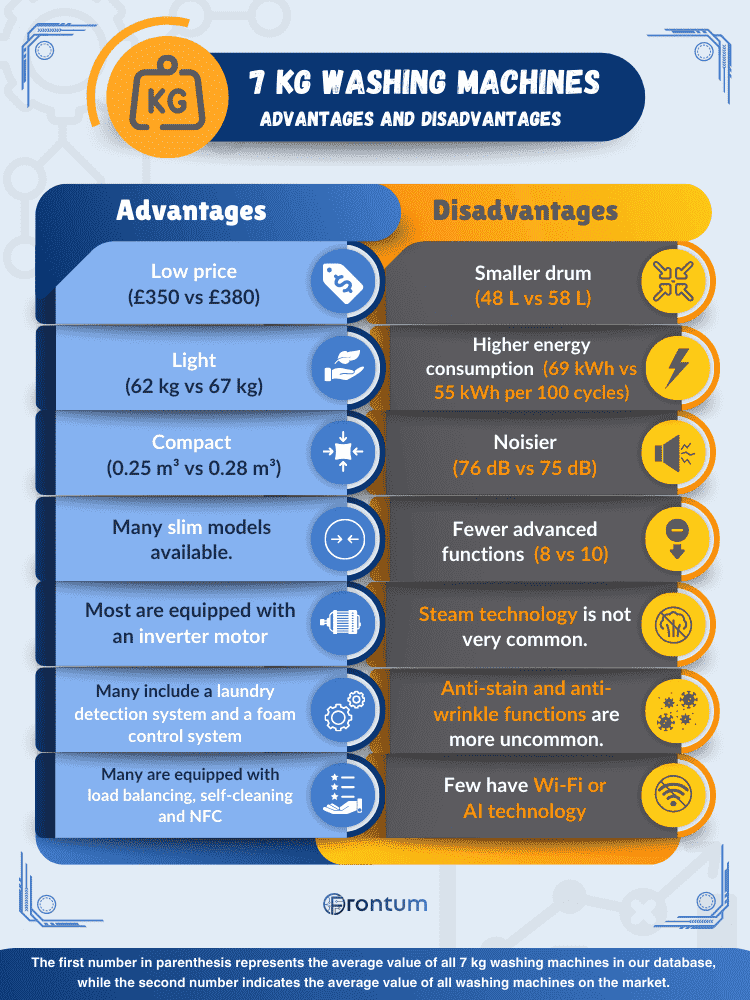
Are 7 kg washing machines large enough?
A 7 kg washing machine is suitable for small to medium households, typically comprising two to three people. It can handle a load of about 35 T-shirts or a double duvet, making it versatile for daily laundry, including clothes, towels, and bedsheets. Larger households may prefer a higher capacity (9 kg or more), especially for washing bulky items like king-size duvets or heavy loads, reducing the number of wash cycles needed.
How many items can fit in a 7 kg washing machine?
A 7 kg washing machine can handle various types of garments depending on the material, size, and weight. Capacity is expressed in terms of the weight of dry laundry, so ensure the load does not exceed 7 kg when dry. To estimate the number of items, consider the weight of individual garments.
A 7 kg washing machine can accommodate the following items.
- 30-35 T-shirts (average weight around 150-200 grams per T-shirt)
- 9-10 pairs of jeans (average weight around 600-700 grams per pair)
- 10-13 bath towels (average weight around 500-600 grams per towel)
- 20-25 shirts (average weight around 280 grams per shirt)
These estimates assume standard sizes and weights. The number of items may vary based on material (e.g., cotton, wool, polyester) and density. Bulky items like towels or heavy fabrics like denim take up more space and capacity in the drum.
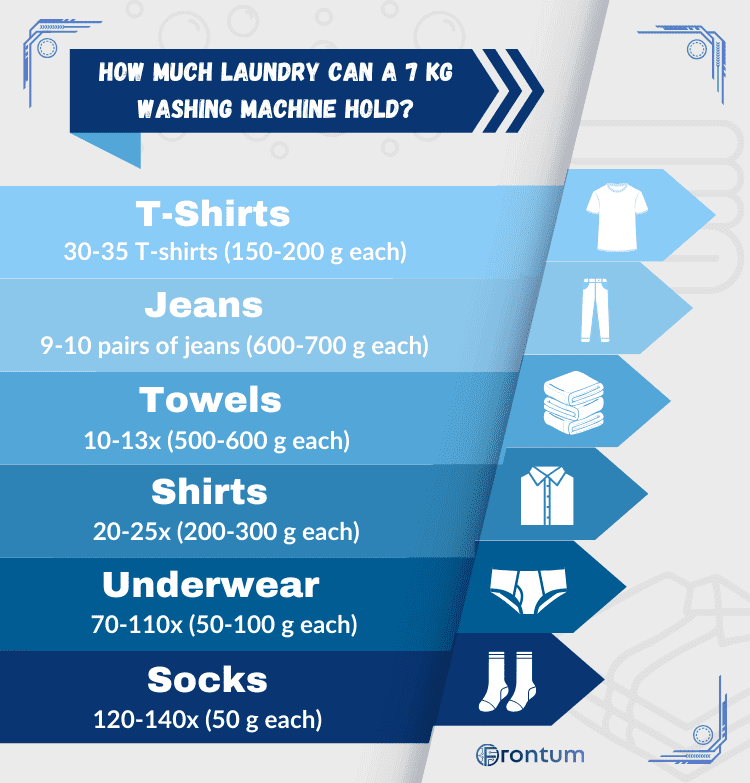
Overloading reduces washing efficiency and can damage the machine over time. It is recommended to load the drum up to 80% of its capacity (around 5.5-6 kg for a 7 kg washing machine) to allow clothes to move freely during the wash cycle.
Is it better to buy a 7 kg or an 8 kg washing machine?
For most households, a 7 kg washing machine is ideal for medium-sized loads or laundry for two to three people. This capacity efficiently handles items like sheets, towels, and clothes, common in smaller families or shared apartments.
An 8 kg washing machine is suitable for larger families with three or four people or more frequent and larger laundry loads. This capacity is perfect for bulkier items, such as duvets, blankets, and heavy towels, which may be challenging to wash in smaller machines. The 8 kg capacity offers flexibility to handle both small and large loads without compromising washing performance.
The 7 kg washing machines with the largest drum volume are as follows.
- Hotpoint NSWF743UW (Drum volume: 62 L litres)
- Candy Smart CBW27D1E-S (Drum volume: 58 L litres)
- Bosch WAN28081GB Serie 4 (Drum volume: 55 L litres)
How much do 7 kg washing machines cost?
A 7 kg washing machine typically costs between £200 and £700, with an average price of around £330. In comparison, 6 kg models have an average price of £290, 8 kg models about £370, and 9 kg washing machines average £480.
The chart below shows the price distribution among available 7 kg washing machine models.
[vertical-chart-76026778]
7 kg washing machines have a ratio quality-price score of 7.1 points, in line with the market average.
The cheapest 7 kg washing machines are as follows.
- Midea MF200W70B/E (~£250)
- Hotpoint NSWF743UW (~£260)
- Beko WTL74051B b100 (~£290)
The 7 kg washing machines offering the best ratio quality-price are as follows.
- Midea MF200W70B/E (Ratio quality-price: 7.9 points)
- Midea MF10EW70BA (Ratio quality-price: 7.42 points)
- Hotpoint NSWF743UW (Ratio quality-price: 7.38 points)
What are the best brands of 7 kg washing machines?
The best brands of 7 kg washing machines are as follows.
- Gorenje (Average overall score: 7.7 points)
- Haier (Average overall score: 7.5 points)
- Hoover (Average overall score: 7.4 points)
The worst brands of 7 kg washing machines are as follows.
- Daya (Average overall score: 5 points)
- Candy (Average overall score: 5.7 points)
- Indesit (Average overall score: 5.7 points)
The chart below ranks the best brands of 7 kg washing machines based on their overall score.
[horizontal-chart-12872992]
Which 7 kg washing machine brands have the highest user ratings?
The 7 kg washing machine brands with the highest user ratings are as follows.
- Samsung (Average user rating: 9.2 points)
- Midea (Average user rating: 8.9 points)
- Gorenje (Average user rating: 8.9 points)
The chart below provides a ranking of 7 kg washing machine brands based on user ratings.
[horizontal-chart-60040766]
What should you consider when choosing the best 7 kg washing machine?
When selecting the best washing machine, you should consider energy consumption (energy class), water consumption, spin efficiency, noise level, motor type, washing programs and features, drum volume, and dimensions.
Are 7 kg front-loading washing machines better than 7 kg top-loading machines?
Front-loading washing machines generally outperform top-loading machines, with an overall score of 7.1 compared to 6.1 for top-loading models. Approximately 83% of 7 kg washing machines on the market are front-loading, while 0% are top-loading.
The chart below shows the distribution of 7 kg washing machines by loading type.
[pie-chart-96974081]
Front-loading 7 kg washing machines offer the following advantages over top-loading models.
- Lower price: Front-loading models cost an average of £330, while top-loading models cost £350.
- Higher user ratings: Front-loading machines have an average user rating of 8.3, compared to 7.5 for top-loading models.
- Better value for money: Front-loading machines have an average ratio quality-price score of 7.2, compared to 6.5 for top-loading models.
- More inverter motors: 67% of front-loading washing machines are equipped with an inverter motor, compared to only 33% of top-loading models.
- Larger drum volume: Front-loading models have an average drum volume of 49 litres, compared to 42 litres for top-loading machines.
- Better energy efficiency: Front-loading washing machines have an average energy class of C, while top-loading models are in class D. Additionally, 18% of front-loading machines are in class A, compared to 0% of top-loading models.
- Lower energy consumption: Front-loading models use an average of 59 kWh per 100 cycles, compared to 78 kWh for top-loading models.
- Quieter operation: Front-loading washing machines have an average noise level of 75 dB during spinning and 53 dB during washing, compared to 78 dB and 60 dB for top-loading models. Their average noise emission class is B, compared to C for top-loading models.
- More efficient spinning: Front-loading machines have an average spin-drying efficiency class of B, while top-loading models are class C. Front-loading machines reach a maximum spin speed of 1400 RPM, compared to 1200 RPM for top-loading models.
- More steam technology: 41% of front-loading washing machines feature steam technology, compared to 20% of top-loading models.
The best front-loading 7 kg washing machines are as follows.
- Midea MF200W70B/E (Overall score: 7.12 points)
- Candy Smart CS41272DE (Overall score: 6.66 points)
- Midea MF10EW70BA (Overall score: 6.66 points)
Top-loading 7 kg washing machines offer the following advantages over front-loading models.
- More functions: Top-loading machines have an average of 11 functions, compared to 7 in front-loading models. Features such as pre-mix technology (47% in top-loading models compared to 6% in front-loading), memory function (40% vs 21%), and AquaStop system (87% vs 61%) are more common in top-loading machines.
- Lower water consumption: Top-loading machines use an average of 42 litres of water per cycle, compared to 46 litres for front-loading models.
- Lighter weight: Top-loading washing machines weigh an average of 56 kg, 8 kg less than front-loading machines (64 kg).
- Smaller footprint: Top-loading machines occupy approximately 0.211 m³, 20% less space than the average 0.261 m³ for front-loading machines.
- Ease of loading and unloading: Top-loading washing machines are designed for easier access from the top.
- Less prone to mould and odours: The design of top-loading machines reduces the risk of mould and odour build-up.
The following is a list of the best top-loading 7 kg washing machines.
- Hotpoint WMTF 722U (Overall score: 5.52 points)
- Hoover H-WASH 300 H3TFMQ47TAMCE-84 (Overall score: 7.34 points)
- Electrolux EW7T337A SteamCare 700 (Overall score: 7 points)
What is the drum volume of 7 kg washing machines?
The drum volume of 7 kg washing machines ranges from 41 to 61 litres, with an average of 48 litres, lower than the overall market average of 58 litres. 8 kg washing machines have a drum volume of 55 litres, while 9 kg models reach 91 litres. Front-loading 7 kg machines have larger drums than top-loading ones, with an average volume of 49 litres compared to 42 litres for top-loading models.
The chart below provides an overview of drum volume sizes among 7 kg washing machine models.
[vertical-chart-68170480]
A larger drum is beneficial for washing bulky items or handling larger loads. Greater capacity can reduce the number of washing cycles, saving time and energy.
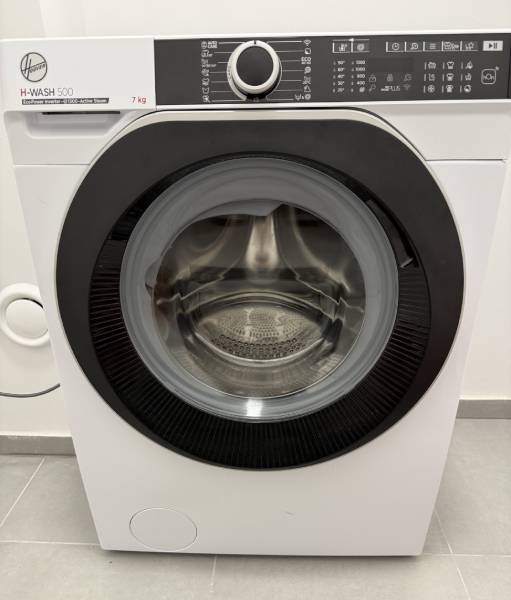
How much space do 7 kg washing machines occupy?
7 kg washing machines occupy between 0.2 and 0.32 m³, with an average of 0.25 m³. Compared to larger capacity models, these machines require less space. For example, 8 kg machines occupy about 0.28 m³, a 12% increase over 7 kg models, while 9 kg machines occupy about 0.3 m³, an 18% increase.
The depth of 7 kg washing machines ranges from 40 to 63 cm, with an average of 54 cm. In comparison, 8 kg models have an average depth of 55 cm, while 9 kg machines reach an average of 58 cm. About 48% of slim washing machines, with a depth of less than 50 cm, have a 7 kg capacity, making this capacity the most common among slim models.
The following 7 kg washing machines take up the least space.
- Hotpoint WMTF 722U (Volume: 216000 cm³)
- Candy Smart CS41272DE (Volume: 229500 cm³)
- Midea MF10EW70BA (Volume: 240231.25 cm³)
What is the energy efficiency of 7 kg washing machines?
7 kg washing machines are generally less energy-efficient than other capacities. Only 23% of these models fall into class A and 20% into class B, while a significant 30% fall into class D. Compared to the market average, where 39% of machines are class A and 17% are class B, 7 kg models tend to be in lower energy classes.
The chart below illustrates the distribution of energy classes among 7 kg washing machines.
[pie-chart-20159385]
Energy consumption for 7 kg washing machines ranges from 44 to 87 kWh, with an average of 69 kWh per 100 cycles (higher than the market average of 55 kWh). Paradoxically, these machines consume more energy than models of other capacities. For instance, 9 kg machines consume an average of 49 kWh per 100 cycles. This high consumption can be attributed partly to fewer advanced technologies and the presence of top-loading models, which tend to consume more energy.
If you want to reduce energy consumption but still desire a 7 kg washing machine, consider a front-loading model, which consumes about 30% less energy than a top-loading one (59 kWh vs 78 kWh). Energy consumption closely depends on the energy class: models in class A consume less than 49 kWh per 100 cycles, while class B models consume less than 55 kWh, though this relationship may vary slightly based on the washing machine's capacity.
In terms of water consumption, 7 kg washing machines use between 37 and 46 litres per cycle, with an average of 45 litres, very close to the market average of 46 litres. Generally, higher-capacity models tend to consume more water; for example, 9 kg washing machines consume about 49 litres per cycle, while 10 kg machines use about 51 litres.
The most energy-efficient 7 kg washing machines (those with the lowest energy consumption) are as follows.
- Midea MF10EW70BA (Energy consumption: 44 kWh/100 cycles per 100 cycles)
- Midea MF200W70B/E (Energy consumption: 52 kWh/100 cycles per 100 cycles)
- Beko WTL74051B b100 (Energy consumption: 69 kWh/100 cycles per 100 cycles)
What is the spin efficiency of 7 kg washing machines?
The spin efficiency of 7 kg washing machines is mainly in class B, with 81% of models in this category, and the remaining 19% in class C. Class B is the most common across all washing machine capacities, representing 85% of models on the market.
The distribution of spin efficiency classes for 7 kg washing machines is presented in the chart below.
[pie-chart-14824315]
Spin efficiency refers to the machine's ability to remove water from garments during the spin cycle. A higher class indicates better water extraction, leaving clothes drier and requiring less drying time.
Spin efficiency is closely related to maximum spin speed. Higher speeds enable better water extraction. In Hoover 7 kg washing machines, the maximum spin speed ranges from 1000 to 1400 RPM. The most common speed is 1400 RPM (47% of machines), followed by 1200 RPM (39% of machines). This aligns with the market average, where 60% of machines have a maximum speed of 1400 RPM and 22% of 1200 RPM. At 1600 RPM, clothes retain about 43% moisture, while at 1400 RPM, 50% remains, and at 1200 RPM, 53% remains.
Maximum spin speed and drying efficiency are crucial if you want clothes to dry quickly, either in a dryer or on a clothesline. However, for those who frequently wash delicate fabrics, the minimum spin speed is equally important. Delicate materials require lower speeds to avoid damage.
In 7 kg washing machines, the minimum spin speed ranges from 400 to 800 RPM. 59% of these machines have a minimum spin speed of 400 RPM, slightly lower than the market average, where 67% of models achieve this minimum speed.
How noisy are 7 kg washing machines?
7 kg washing machines produce noise levels during spinning ranging from 67 dB to 80 dB, with an average of 76 dB (slightly above the market average of 75 dB). Spin noise is the loudest part of the washing process, making it the most indicative measure of a machine's noise level.
The noise emission class, ranging from A to D, also helps assess noise levels: A is under 73 dB, B is between 73-76 dB, C is 77-80 dB, and D is over 80 dB. Most 7 kg washing machines fall into class B (44%), followed by class C (30%), and class A (25%).
The chart below illustrates the distribution of spin noise levels for 7 kg washing machines.
[vertical-chart-88037456]
Washing noise levels (generally lower than spin noise) range from 46 to 62 dB, with an average of 53 dB, aligning with the market average. If you’re looking for a quieter washing machine, especially for shared or open-plan spaces, it’s worth paying close attention to these noise levels.
How many washing programs do 7 kg washing machines offer?
7 kg washing machines typically feature 10-16 washing programs, a number similar to the market average, and often include 1-3 quick cycles under an hour.
All 7 kg washing machines offer basic programs such as Cotton, Eco 40-60, Synthetics, Quick, Mixed, Wool, etc., while specialised programs vary by model. The most common specialised cycles include Jeans cycle (38%), Outdoor/Sport cycle (48%), Baby Care cycle (27%), Hygiene cycle (51%), Anti-Allergy cycle (52%), Shirt cycle (35%), and Duvet cycle (39%).
The programs of 7 kg washing machines are similar to those of other capacities, with some differences. The following cycles and functions are less common in 7 kg models compared to washing machines of other sizes.
- Steam cycle/technology (38% in 7 kg washing machines vs 58% in others)
- Anti-stain cycle/function (53% vs 70%)
- Anti-Allergy cycle (52% vs 68%)
- Outdoor/Sport cycle (48% vs 67%)
The chart below shows the distribution of the number of washing programs in 7 kg washing machines:
[vertical-chart-96416501]
Many 7 kg washing machines also include features such as anti-stain (48%), rinse hold (35%), extra rinse (75%), or quick function (39%). A few models include soak function (6%), Aqua+ (10%), or silent mode (8%).
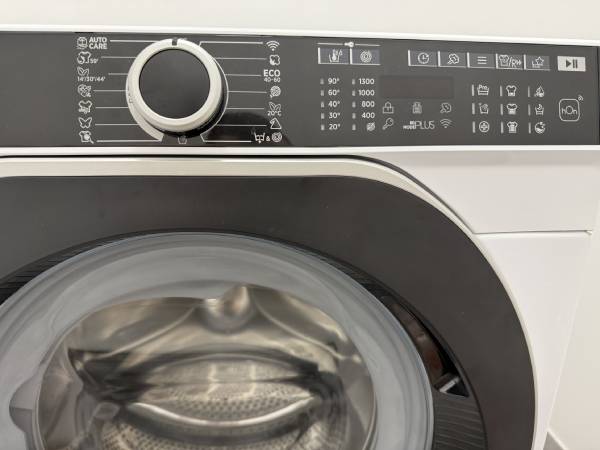
What features do 7 kg washing machines have?
7 kg washing machines typically include 5 to 13 features, with an average of 8 features (2 fewer than the market average).
The chart below illustrates the distribution of features in 7 kg washing machines.
[vertical-chart-35537301]
Most 7 kg washing machines are equipped with a laundry detection system (85%), unbalanced load detection system (95%), foam control system (86%), and Pause & Add function. Many models also include a self-cleaning function (55%), load balancing system (47%), and AquaStop system (36%). Additionally, 63% of these washing machines feature an efficient inverter motor. Some more advanced models integrate memory function (25%), pre-mix technology (13%), automatic drawer cleaning (8%), NFC connectivity (12%), energy-saving mode (11%), and water jet system (10%).
The features of 7 kg washing machines are comparable to those of other capacities, with some differences. The following features are less common in 7 kg washing machines compared to others.
- Steam technology (present in 38% of 7 kg washing machines, compared to 57% of all washing machines)
- Smart diagnosis (27% compared to 43% of all washing machines)
- Wi-Fi connectivity (<3% compared to 23% of all washing machines)
- AI technology (<3% compared to 11% of all washing machines)
- Automatic dosing system (<3% compared to 7% of all washing machines)
The 7 kg washing machines with the highest number of features are as follows.
- Candy Smart CS41272DE (16 features)
- Midea MF200W70B/E (10 features)
- Candy Smart CBW27D1E-S (9 features)

